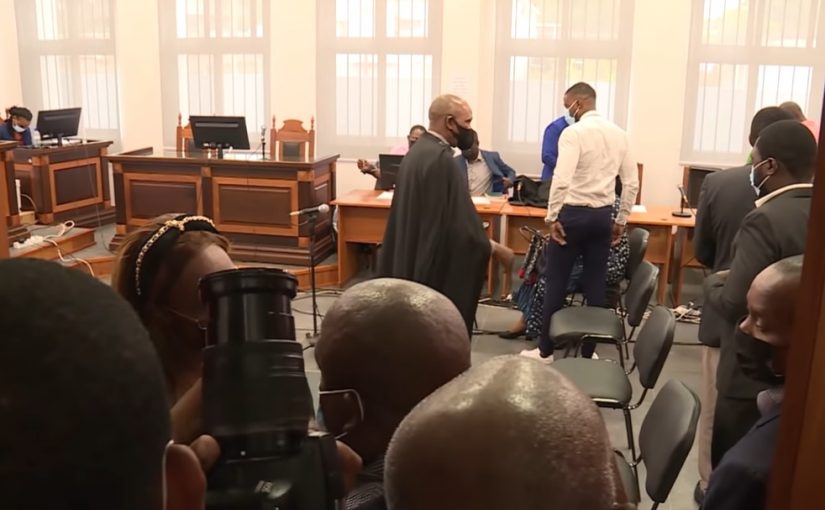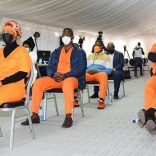Mozambique: Cabo Delgado "under control" with FDS pursuing terrorists
Mozambique: Trial of former Minister of Labour begins – AIM report | Watch

Screen grab: Miramar
The Mozambican Public Prosecutor’s Office on Tuesday demanded that former Labour Minister Helena Taipo, and her ten co-accused in a major corruption trial, should repay, in full and with interest, the 113 million meticais (about 1.8 million US dollars) which they allegedly stole from state coffers.
At the start of the trial, held in a courtroom in the Maputo municipal district of Katembe, the prosecution laid out in great detail how the corrupt schemes had operated.
Taipo was at the top of the pyramid of theft. It was she who had supposedly organized a series of operations whereby the Mozambican state was swindled out of well over 100 million meticais. She is facing charges of embezzlement, abuse of trust and illicit participation in business.
Below the former minister, three names of senior Labour Ministry officials appear on the indictment – Anastacio Zita, the Director of Migrant Labour at the time of the alleged crimes, Jose Mondlane, the head of finance in the migrant labour directorate, and Pedro Taimo, who was once the Labour Ministry’s representative in South Africa, dealing directly with Mozambican migrant mineworkers and their pension funds.
The prosecution claims that Taipo and the three officials dealing with migrant labour controlled the fees paid by South African companies for the recruitment of Mozambican labour, and the bank account into which were paid funds for future pensions, and unclaimed wages.
As from 2014, they began to help themselves to this money. The first of these scams was organized by Taipo herself, said the prosecution. She claimed that six million meticais was used to organize an event – the event turned out to be fictitious but the money was not. Taipo was assisted by one of her co-accused, Baltazar Mongoi, who falsified documentation for the event.
Taipo then spent five million meticais of state money to build a house for her daughter in Muaivire, in the northern province of Nampula. This was money that was supposedly spent on building a technical block in the Alberto Cassimo Institute for Professional Training and Labour Studies (IFPELAC), in the Nampula district of Malema – work that was never done.
In this scheme, Taipo was assisted by the owner of a Nampula building company, Sheng Zhang, and his manager, Dalila Lalgy, who provided false documents.
Taipo authorized the use of 21 million meticais for purposes that had nothing to do with the Labour Ministry, such as the acquisition of an electrical pump and various agricultural inputs. In this she was assisted by Hermenegildo Nhantave, an official in the Agriculture Ministry, whom she paid 375,000 meticais.
Money was also used to organize parties, and to buy baskets of goods to be offered as presents at Christmas. Taipo also obtained 50 bicycles to be distributed in Nampula. She was assisted by a member of her staff, Sidonio Manuel, whom she paid 200,000 meticais.
The prosecution also accuses Taipo of authorizing a series of administrative acts, with no legal basis, under which contracts were simulated with various types of services (such as building companies and printers). The suppliers would over-invoice for their services, and Taipo and her accomplices allegedly skimmed off the amount over-invoiced.
Among the source of the money taken were accounts holding wages for Mozambican miners that had not been claimed.
“As public servants, you had the task of dealing with the social insertion of the miners”, said the prosecuting attorney, Armando Parruque, “but instead you took the miners’ money for the interests of your families, and simulated contracts which never benefitted the miners”.
Taipo denies all the charges. Her lawyer accused the public prosecutor of “distorting the facts in order to incriminate her”. All the authorisations signed by Taipo, as Minister, he claimed. “obeyed all the administrative procedures”.
Unlike the trial of the 19 people accused of financial crimes in connection with the scandal of Mozambique’s “hidden debts”, this trial is not being broadcast live – and there was even an attempt to exclude the media from the courtroom altogether.
But the journalists stood their ground, pointing out to court officials that under Mozambican law trials are public, and excluding the press would therefore be illegal. So the media were allowed to stay, but could not broadcast the proceedings live.
Watch the Miramar report.













Leave a Reply
Be the First to Comment!
You must be logged in to post a comment.
You must be logged in to post a comment.